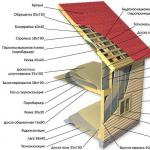Test on the topic “Main and secondary members of a sentence”
The grammatical basis of a sentence is...
a) phrase b) noun and verb c) any two words
d) subject and predicate
2 . Which member of the sentence answers the questions WHO? WHAT?
a) noun b) subject c) predicate d) object
3. Which member of the sentence answers the questions WHAT DOES? WHAT DID YOU DO?
a) verb b) subjectc) predicate d) adverbial
4. Which member of the sentence answers the questions WHAT? WHICH? WHICH? WHICH? WHOSE?
a) adjective b) circumstances) definition d) addition
5. Which part of the sentence answers the questions WHERE? WHEN? WHERE? WHY?
a) predicate b) circumstances) definition d) addition
6. Which member of the sentence answers WHO's questions? WHAT? TO WHOM? WHAT? BY WHOM? HOW? ABOUT WHOM? ABOUT WHAT?
a) noun b) circumstances) definition d) addition
7. Which sentence consists only of main members?
a) Soft snow covered the ground. b) It snowed. c) Snowball on the ground. d) Covered the ground.
8. What type of sentence is in front of you?Gray cobwebs swirl in the air.
a) complete b) incomplete c) widespread d) not widespread
9. Indicate the grammatical basis of the sentence:In the clearing, the hunters lit a large fire.
1) a big fire 2) they lit a fire 3) the hunters lit it 4) there are hunters in the clearing
10. Choose the sentence in which the grammatical basis is incorrectly highlighted:
1)Bear eats sweet raspberries.
2)Children before eating wash hands.
3)in autumn are coming heavy rains.
4) In the forest costs deep silence.
11. Write down the sentence and highlight all the circumstances.
At night, owls screeched terribly in deep hollows.
12. Write down the sentence and underline all additions.
The painter painted the window frames with white paint.
13. Write down the sentences and underline all definitions.
The grass rose like a green brush in the vast fields.
14. Write out the phrases from the sentence .
The maple leaves in the park were turning red.
Test on the section “Major and minor members
offers"
Option I
Indicate the numbers under which the main members of the sentence are listed:
1) subject;
2) definition;
3) addition;
4) circumstance;
5) predicate.
1) The subject can be expressed by a pronoun in the nominative case.
2) The subject can be expressed by the infinitive form of the verb.
3) The subject can be expressed by a short adjective.
4) The subject can be expressed by a numeral.
Please indicate the correct statement:
1) The definition can be expressed by a noun in the indirect case.
2) The definition can be expressed by a participle.
3) The definition can be expressed by a gerund.
4) The definition can be expressed by a verb in an indefinite form.
Where do conscience and truth live?
1) Noun in the nominative case (conscience).
2) Noun in indirect case (with the truth).
3) A phrase (word with truth).
4) Verb (live).
In a sentence Vladimir Dal's grandmother was a translator predicate:
1) simple verb;
2) compound verb;
3) compound nominal.
In which sentences should a dash be placed between the subject and the predicate?
1) Five five twenty five.
2) Summer nights in St. Petersburg are a continuous evening dawn.
3) Twenty is divided by two.
4) The snow at the porch is like quicksand.
1) Handsome man;
2) giant plant;
3) winter-sorceress;
4) Moscow River.
Where does a rose without thorns grow?
1) Adverb (Where);
2) noun (rose);
3) a noun in the indirect case (without thorns);
4) verb (growing).
How is the addition expressed in a sentence? We asked the girl to sing?
1) pronoun (We);
2) verb (asked);
3) infinitive form of the verb (sing);
4) noun (girl).
1) Metaphor;
2) personification;
3) epithet;
4) comparison.
Read the text and complete tasks B1–B5.
(1) While studying at the gymnasium, Gogol played in many plays staged on the stage of the student theater. (2) His performances of female roles were successful, especially the role of the landowner Prostakova in Fonvizin’s “The Minor.”
(3) The plot of “The Inspector General” was suggested to Gogol by Pushkin. (4) The comedy was written within two months, and subsequently the playwright, worried about the future of the play, was present at rehearsals, giving valuable advice to the actors. (5) His satire was as sharp as a knife cutting down an enemy.
Indicate the numbers of sentences in which the circumstance expressed by the adverbial phrase occurs.
Indicate the numbers of the sentences in which the compound nominal predicate occurs.
Indicate the means of linguistic expression found in sentence 5.
Indicate the numbers of the sentences that contain the participial phrase. What part of the sentence is it?
Indicate the number of the sentence in which the derived preposition occurs.
Key: A1 – 1, 5; A2 – 3; A3 – 1, 2, 4; A4 – 3; A5 – 3; A6 – 1, 2; A7 – 1; A8 – 3; A9 – 3, 4; A10 – 3 (4); B1 – 1, 4; B2 – 2, 5; B3 – comparison; B4 – 1, 4, 5, definition; B5 – 4.
Option II
Indicate the numbers under which the minor members of the sentence are listed:
1) subject;
2) definition;
3) addition;
4) circumstance;
5) predicate.
State the incorrect statement:
1) The predicate can be expressed by a gerund.
2) The predicate can be expressed by the infinitive form of the verb.
3) The predicate can be expressed by a short adjective.
4) The predicate can be expressed by a numeral.
Please indicate the correct statement:
1) The circumstance can be expressed by a noun in the nominative case.
2) The circumstance can be expressed by a participle.
3) The circumstance can be expressed by a gerund.
4) The circumstance can be expressed by a verb.
What is the subject of a sentence? Five people reached the pole on skis?
1) Verb (got it).
2) Numeral (five).
3) A phrase (five people).
4) Noun in indirect case (Human).
In a sentence I started learning English in the fifth grade predicate:
1) simple verb;
2) compound verb;
3) compound nominal.
In which sentence should a dash be placed between the subject and the predicate?
1) Life is an endless exam.
2) Clouds are like fancy castles.
3) Simplicity is a necessary condition for beauty.
4) I am a teacher.
Which application uses the hyphen incorrectly?
1) Cabbage butterfly;
2) general practitioner;
3) boletus mushroom;
4) stag beetle.
How is the circumstance expressed in the sentence? And the sounds will fly, showing off and playing?
1) Verb (will fly);
2) participle (showing off);
3) participle (playing);
4) noun (sounds).
How is the definition expressed in a sentence? The command was given to raise the sails?
1) Verb (sounded out);
2) noun (team);
3) noun (sail);
4) phrase (raise the sails).
Which means of linguistic expression most often contains a definition?
1) Metaphor;
2) personification;
3) epithet;
4) comparison.
Read the text and complete tasks B1-B5.
(1) The stomach of a crocodile is a hellish chemical plant, digesting everything: wool, horns, hooves. (2) Even iron hooks are gradually corroded in his stomach.
(3) The crocodile does not avoid sushi. (4) His favorite pastime is to bask on the sandy shore of a reservoir. (5) In case of obvious danger, he rushes into the water, bending his body, throwing his hind legs far forward. (6) He is the boss here.
Which sentences require a dash between the subject and the predicate? (There are no punctuation marks.)
Indicate the number of the sentence in which the predicate is expressed by a noun in the nominative case.
Indicate the number of the sentence in which the predicate is expressed in the infinitive form of the verb.
What means of linguistic expression are found in sentence 1?
Indicate the number of the sentence containing the participial phrase. What part of the sentence is it?
Key: A1 – 2, 3, 4; A2 – 1; A3 – 3; A4 – 3; A5 – 2; A6 – 1; A7 – 3; A8 – 2, 3; A9 – 4; A10 – 3 (4); B1 – 1, 4; B2 – 1, 6; B3 – 4; B4 – metaphor, epithet; B5 – 5th circumstance.
Russian language test Main and minor members of a sentence for 8th grade students with answers. The test consists of 2 options, each option has 3 parts (Part A, Part B, Part C). In part A - 10 tasks, in part B - 3 tasks, in part C - 1 task.
1 option
A1.
1) Two Children about five years old were rushing around the round table standing in the center.
2) Who called you?
3) And on the shore it’s pouring with might and main rain and knocks on the leather roof of the tent.
4) Uzho- an obsolete adverb.
A2. Which sentence has a compound verb predicate?
1) I went down the cliff to the river and immediately caught four large trout.
2) We would like to know the secret of the Bermuda Triangle.
3) The teacher will help the children solve this problem.
4) I went upstairs and put the fish on the grass.
A3. Which sentence has a compound nominal predicate?
1) He wanted to breathe clean air.
2) The earth looked like a snow-white carpet.
3) Now he will scoop up a bucket of cold water and pour it on his head.
4) Don't hope for a miracle.
A4.
This question now turned out to be completely unnecessary.
1) turned out to be
2) it turned out, now
3) turned out to be unnecessary
4) turned out to be completely unnecessary
A5. In which sentence should you not put a dash in place of the gap?
1) Spring... my favorite time of year.
2) With a friend and grief... it doesn’t matter.
3) The essence of life... love.
4) A kind word... sunshine in bad weather.
A6.
1) Taxi stopped near the entrance.
2) This car - Taxi.
3) I'll call Taxi by phone.
4) B Taxi we will continue the conversation.
A7.
1) door to the balcony
2) striped fabric
3) window to the garden
4) leather gloves
A8.
Due to drought, the river became shallow.
1) circumstance of the course of action
2) circumstance of time
3) circumstance of the reason
4) circumstance of condition
A9. Which answer choice contains sentences in which there must be a hyphen between the application and the noun being defined?
A. A golden cloud spent the night on the chest of a giant cliff.
B. The book was called “The Miracle Hero Suvorov.”
V. The old housewife was snoring behind the partition.
G. The old monk followed him.
1) A, G
2) B, C
3) A, B
4) V, G
A10.
His the briefcase lay on the table for a long time.
1) definition
2) circumstance
3) addition
4) application
(1) It has long seemed to me that reading books has passed the brief period when it was universal entertainment.
(2) The movie, no matter how well made, could not compete with all the desire - going to the cinema was a separate event, and a book is always at hand.
(3) Television, even when it acquired color and large screens, did not satisfy everyone at once.
(4) Then the video and the computer dealt their blow.
(5) Cinema is reading for the poor in spirit. (6) For those who are unable to imagine the war of the worlds, imagine yourself on the bridge of the Nautilus.
(7) Almost the same with computer games. (8) This is suddenly a book that comes to life, in which you are free to choose whose side you are on.
(9) And reading returned to its original state. (10) To the time when it was the entertainment of the smart. (11) Books have become more expensive, circulations have become smaller - much like in the 19th century. (12) For me, it’s better to admit: reading is not a pleasure for everyone. (13) And it’s not just pleasure, it’s work.
(S. Lukyanenko)
B1. Write out the grammatical basis from sentence 5.
AT 2. From sentence 1, write out the direct object.
AT 3. Among offers 5-7, find an offer with an application. Write the number of this offer.
C1. How do you understand the words of S. Lukyanenko: “...Video and the computer dealt their blow”?
Option 2
A1. In which sentence is the subject highlighted incorrectly?
1) Five carefully enter the water.
2) Passersby bend over backwards, walking against the wind.
3) It rose from the sea some flat stones.
4) Evil with the evil one They fiddled around, but they both fell into a hole.
A2. In which sentence is the predicate a compound verb?
1) The mother was alarmed by her daughter’s long absence.
2) I will ride the bike for a long time.
3) The expression on his face became stern.
4) No one wanted to leave the square that night.
A3. In which sentence is the predicate a compound nominal?
1) He decided to wait a few minutes.
2) Deniska wanted to stay at home for a few days.
3) Sergei could not step on his bad leg.
4) The house was built by the builders within the time period specified in the contract.
A4. Which answer option correctly lists the words that are predicates in the sentence?
My grandfather was a man: not rich.
1) was
2) was, man
3) was, not rich
4) was a poor man
A5. In which sentence should you not put a dash in place of the gap?
1) She... is a girl with character.
2) My rule... tell the truth.
3) The sun... a ball of fire.
4) Courage... the vital energy of the soul.
A6. In which sentence is the underlined word an object?
1) Almost all shore occupied by fishermen with fishing rods.
2) On shore Several jellyfish were thrown out of the sea.
3) Shore This river is a complete swamp.
4) Amazing creation of nature - shore this mountain river.
A7. Which of the inconsistent definitions cannot be replaced by a synonymous consistent one?
1) wool sweater
2) checkered jacket
3) first grade student
4) beige dress
A8. Determine the type of circumstance in the sentence:
It's been raining for the second day.
1) circumstance of place
2) circumstance of time
3) circumstance of the reason
4) circumstance of condition
A9. Which answer choice contains sentences in which there must be a hyphen between the application and the noun being defined?
A. Most often I met with the grumpy old man, the basket maker.
B. The old Ukrainian hurriedly opened the creaking fence in front of the lathered horses.
B. The angry dog Grumpy is tied to an iron chain.
G. A small village near Moscow on the steep bank of the Moscow River was very cozy.
1) A, G
2) B, C
3) A, B
4) V, G
A10. Which part of the sentence is the highlighted word?
Their my son went to study in Moscow.
1) definition
2) application
3) addition
4) circumstance
Read the text, complete tasks B and C.
(1) Once Grishka Garin tried to bring to work a questionnaire from the English magazine Life.
(2) Based on the results of the questionnaire, the characters were revealed: Sashka is a fighter for truth with a philistine bias, Zheleznov is, without a doubt, a gloomy tyrant, Irka is just a child with undeveloped taste, Grishka is an Arab by nature, without philistinism, I am an offended philistine.
(3) There was another character for which I did not have enough plus - an intelligent person.
(4) The most I can do is run away from work and go to the cinema for an afternoon session.
(5) My wife’s name is Masha, my daughter’s name is Vitka. (6) Vitka is different from other children in that she is my daughter. (7) I don’t doubt for a second that my daughter is a most talented creative being and in the future something will come out of her that didn’t come out of me.
(8) Vitka loves me. (9) For her, I am the smartest and most beautiful, and she will never exchange me for anyone. (10) Vitka is a reliable person.
(According to V. Tokareva)
IN 1. Write out 1 grammatical basis from the sentence.
AT 2. Write out an agreed definition from sentence 3.
AT 3. Among offers 1-3, find an offer with an application. Write the number of this offer.
C1. Who can be called an intelligent person?
Answers to the Russian language test Main and minor members of a sentence
1 option
A1-1
A2-2
A3-2
A4-3
A5-2
A6-3
A7-3
A8-3
A9-3
A10-1
IN 1. Cinema - reading
AT 2. period
AT 3. 6
Option 2
A1-3
A2-4
A3-4
A4-4
A5-1
A6-1
A7-3
A8-2
A9-3
A10-1
IN 1. Grishka Garin tried to bring
AT 2. intelligent
AT 3. 1
Target: establishing the level of development of subject, meta-subject and personal results of students on the topic “Main and secondary members of a sentence”.
Standard requirements :
Personal results:
formation of a responsible attitude towards learning,
formation of the ability to self-esteem and self-control.
Meta-subject results:
the ability to consciously choose the most effective ways to solve educational and cognitive problems,
the ability to evaluate the correctness of completing a learning task.
Subject results:
consolidation of knowledge about the main and minor members of a sentence,
the ability to distinguish minor members of a sentence from the main ones,
ability to distinguish between common and non-common sentences,
consolidating the ability to determine ways of expressing the main and minor members of a sentence.
Instructions for performing the work
All work is allocated to30 minutes.
The work consists of 6 tasks . Among them: 1 task with an alternative answer (task 1), 1 multiple choice task (task 2), 1 matching task (task 4), 1 task with a given answer structure (task 3), 1 creative task for writing sentences requiring the application of knowledge in practice (task 5), 1 advanced level task with a free answer (task 6).
Exercise 1 . Of the two proposed answer options, you must choose one correct one. For a correct answer - 1 point.
Task 2 . Of the three proposed answer options, you must choose one correct one. For a correctly specified sentence - 1 point.
Task 3. A task with a given answer structure. It is necessary to write out the grammatical basis from the given sentence. For a correct answer - 1 point.
Task 4 . Compliance must be established. The maximum score for the task is 6.
Task 5 . Free-response task. Compose and write down a sentence in which the predicate is expressed by a noun in the nominative case. For a correctly composed sentence - 2 points.
Task 6 . It is necessary to answer the question by arguing your point of view. The maximum score for the task is 3.
The maximum number of points for the entire work is 14.
Test on the topic “Main and secondary members of a sentence”
1. Note which parts of the sentence express the grammatical basis:
A) subject and predicate; B) addition and definition.
2. Mark the unused sentence:
A) Winter has come. B) We went to the forest. C) A book is your best friend.
3. Identify and write the grammatical basis in the sentence below.
In the morning the wind dispersed the fogs.
Answer: __________________________________.
4. Match the words from the example below with parts of the sentence and parts of speech, write the answer in the empty table.
My brother sent me a wonderful gift from Moscow
| Part of speech | Sentence member |
|
| wonderful | noun | circumstance |
| present | verb | subject |
| to me | adjective | predicate |
| sent | pronoun | addition |
| Brother | pretext | definition |
| from Moscow |
| Part of speech | Sentence member |
|
| wonderful | ||
| present | ||
| to me | ||
| sent | ||
| Brother | ||
| from Moscow |
5. Come up with and write down one sentence in whichpredicate expresseda noun in the nominative case.
Answer:_______________________________________________________________________.
6. Do you think it is possible to transform an uncommon sentence into a common one? Which sentence parts will help you in this transformation? Give examples.
Criteria for assessing knowledge control tests
| Excellent rating | 85 - 100% correct answers | 12 - 14 points |
| Rated "good" | 64 - 84% correct answers | 9 - 11 points |
| Rating "satisfactory" | 43 - 63% correct answers | 6 - 8 points |
| Rating "unsatisfactory" | 42% or less correct answers | 0 - 5 points |
Specification
| Compo nents figure ness | UUD | Criteria | № tasks | Max. point |
| Emotional-psychol. | Personal | The ability to distinguish the main parts of a sentence from the minor ones. | ||
| Regulatory | Regulatory | Understanding and determining the type of sentence. Recognizing common and uncommon sentences. | ||
| Social | commu- nicative | The ability to find the main and minor members in a sentence and correlate them with the parts of speech by which they are expressed. | ||
| Analytical | Cognitive | Ability to correctly grammatically base a sentence. | ||
| Creative | Personal | The ability to compose sentences in which the predicate is expressed by a noun in the nominative case. | ||
| Self-improvement | Regulatory | Ability to justify your answer and give examples. |
Answers and evaluation criteria
| № tasks | 1 | 2 | 3 |
| Answer | the wind dispersed |
Task 4
| Part of speech | Sentence member |
|
| wonderful | adjective | definition |
| present | noun | addition |
| to me | pronoun | addition |
| sent | verb | predicate |
| Brother | noun | subject |
| from Moscow | noun with preposition | circumstance |
Task 5 - 2 points are given for a correctly composed sentence in which the predicate is expressed by a noun in the nominative case.
Task 6 - 1 point is given if the student answered positively (yes) to the question asked. You can get 1 point for the given argument:
When transforming an uncommon sentence into a common one, we will need secondary members of the sentence, such as a definition, an addition, a circumstance, since they complement and clarify the grammatical basis.
Examples (1 point): Dad came. Dad came home. Joyful dad came home. Joyful dad came home with a Christmas tree.
| № tasks | Criteria for evaluation | Point |
| 1-3 | the correct answer is written out; other cases; | |
| for six correctly completed correlations; for five correctly completed correlations; for four correctly completed correlations; for three correctly completed correlations; for two correctly completed correlations; for one correctly completed correlation; other cases; | ||
| task completed correctly; other cases; | ||
| correctly completed task (the answer is positive, arguments and examples are provided as evidence); partially correctly completed task (the answer is positive, or arguments without examples are given, or examples without arguments); partially correctly completed task (a positive answer was given); other cases. |




